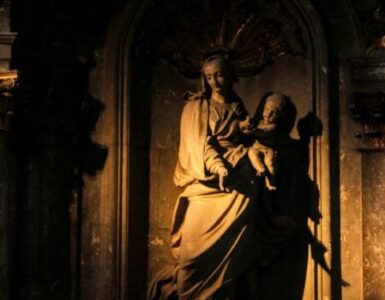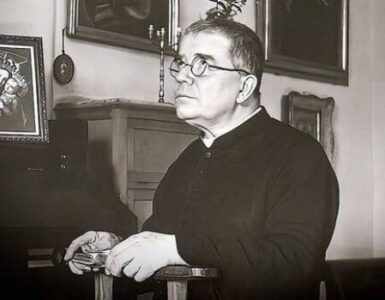Part 31 of This Present Paradise: A Series of Reflections on St. Elizabeth of the Trinity
(Start with part 1 here.)
Several years ago, I was awakened suddenly in the middle of the night and prompted to pray for a priest. I had known him for only one year; he was the principal of my grade school when I was eight years old. I said a Hail Mary, rolled over, and tried to go back to sleep. But something inside moved me to find out what had happened to this kind man who had personally prepared me for my first confession.
Urged by an interior summons, and unable to sleep until I obeyed, I obligingly slipped out of bed and tiptoed to the computer.
With my hands poised over the keyboard, I realized that I didn’t remember his last name. Honestly, I didn’t think I had ever known it. What am I even doing? I wondered. Then, with a flash of clarity, as if someone was dictating to me, I suddenly knew what it was.
When I typed it in, his obituary flashed onto the screen. He had died two days before. And the obituary had been posted just moments ago—right when I had been woken up.
There’s more to that story. But the first and most important message to me in that instant was the absolute and fundamental importance of praying for our priests.
It’s something that the cloistered Carmelites knew well and took to heart. From behind the walls of the convents, the sisters saw it as part of their vocation to offer their prayers and sacrifices in a particular way for those commissioned to be ‘other Christs’ and spread the gospel throughout the world. This is the reason that St. Thérèse, who never left her convent after she entered at fifteen, could be named patroness of the missions by Pope Pius XI in 1927, two years after she was canonized.
Like her spiritual sister, Elizabeth of the Trinity had a great love for the priesthood. She was particularly devoted to Canon Angles, the priest to whom she had first entrusted the secret of her vocation. She would write to him as a spiritual daughter throughout her years in the convent, always remembering him in her prayers and valuing the power of his priestly prayers for her, particularly the ‘perfect prayer’ of the Mass: “I know,” she wrote to him, “that you are praying for me every day at Holy Mass. Oh, won’t you please place me in the chalice so my soul may be wholly bathed in this blood of my Christ for which I so thirst!” (L 131) In return, she assured him a “large share” of her own prayers. (L 190)
This beautiful reciprocity and complementarity of prayer took on another rich dimension when Elizabeth was asked to “adopt” a missionary to China, Henri Beaubis, to pray for and to encourage. Her inspired letters to him—some of her best—reveal that she had an understanding of the mysteriously apostolic side of her own vocation:
I am praying fervently for you, that God may invade all the powers of your soul, that He may make you live in communion with His whole Mystery, that everything in you be divine and marked with His seal, so that you may be another Christ working for the glory of the Father! You are praying for me, too, aren’t you? I want to be an apostle with you, from the depths of my dear solitude in Carmel, I want to work for the glory of God…May our souls be one in Him, and while you bring Him to souls, I will remain, like Mary Magdalene, silent and adoring, close to the Master, asking him to make your word fruitful in souls. ‘Apostle, Carmelite,’ it is all one! (L124)
It was her desire that through his work and her prayer, they would draw down graces upon the world.
There was also to be a priest in the family—she was introduced to her sister’s brother-in-law, the seminarian André Chevignard. Because he was nearby in the diocesan seminary, he was able at times to visit her in the convent parlor and speak to her from behind the closed grille. She added him to her prayers, and he received the benefit of an entire convent’s friendship—the community ‘adopted’ him and was delighted when he chose to celebrate his first Mass in their chapel.
Elizabeth was sensitive to a particularly difficult struggle in this seminarian’s life. She desired to bring him peace in what was a turbulent time not only for the Church in France but their diocese in particular. The Bishop of Dijon seemed to be siding more with the anti-Catholic government than with Rome, and for that he would eventually be asked to resign. We can imagine what anxiety this would cause a young man in the local seminary. She assured him, “My soul loves to unite with yours in one single prayer for the Church, for the diocese.” (L 191)
“I have prayed for you and continue to do so every day,” she said, “and I remain profoundly united to you in Him who is an immensity of love and who fills us overflowing on all sides.” (L 199)
St. Thérèse also exercised her spiritual maternity in this exquisite way, promising union in God to the seminarian she considered her spiritual brother, Maurice Bellière: “United in Him, our souls will be able to save many others, for this kindly Jesus has said: ‘If two among you agree together on something which they ask from my Father, it will be given to them.’ Ah! What we ask of Him is to work for His glory, to love Him, and make Him loved. How should our union and prayers not be blessed?”
“I don’t know the future,” she wrote, “but if Jesus makes my premonition come true, I promise to remain your little sister in heaven. Far from being broken, our union will become a closer one, for then there will be no more cloister and no more grilles, and my soul will be free to fly with you to the missions far away. Our roles will still be the same. Yours will be apostolic labor, and mine will be prayer and love.” (letter of Feb 24, 1897)
Both of these saints saw clearly their apostolate of prayer and sacrifice for the Church’s mission in the world—to give their lives, in layer upon layer of a daily sort of death, for the world’s salvation, and do it all in complete hiddenness. To be able to cooperate specifically with someone in this task who was consecrated to be ‘another Christ’ in the ministerial priesthood was an incredible joy.
I love this thought, that the life of the priest (and of the Carmelite) is an Advent that prepares for the Incarnation in souls. (Letter 250)
Just as the young Carmelites were asked by their Mother Superiors to embrace the mission of prayer for priests in a particular way, the Church as our Mother invites all of us to participate in this all-important assignment. We all have a share in the universal priesthood of Christians through our baptism. More than that, we have a vocation to pray and sacrifice for the Church’s ordained sons, a vocation which is now—praise God—spreading more and more out from the convents to the wider community. The need is too great not to summon the entire body of believers to their knees.
Have priests and seminarians ever needed our prayers more? Have these men in the front lines ever needed spiritual back-up as they do now? Have they ever faced such cultural hostility, pressures from within and without the Church, incessant temptation from the enemy of souls who seeks to distort the image of Christ in the priest?
It’s our job to beg down graces on these men. To preserve their vocations, to multiply the fruits of their labor, to strengthen their resolve, to call them to greatness. I recently heard a young priest thoughtfully answer the question What do priests today need? “We don’t need comfort,” he said. “We need courage.”
In Kathleen Beckman’s excellent book, Praying for Priests, she quotesFr. John Hardin, S.J.: “Having taught priests for over 30 years, having lived with priests, having labored for them, loving them and suffering with them—no words I can use would be too strong to state that the Catholic priesthood needs prayer and sacrifice as never before since Calvary.”*
So say an extra prayer for priests today: suffering priests, lonely priests, overwhelmed priests, the priests who baptized you, who gives you the Eucharist. The priest who prepared you for your first reconciliation and heard your confession…who knows? The connection may be so powerful it may reach all the way into eternity and shake you awake at night. God has a way of connecting us like that…He is a good Father.
*For more, listen in to this interview on Divine Intimacy Radio with Kathleen Beckman on Praying for Priests.
This article originally appeared on SpiritualDirection.com and is reprinted here with kind permission.













